人教新目标(Go for it)版七年级下册Unit 6 I'm watching TV. Section A 1a~2d课件(共27张PPT)
文档属性
| 名称 | 人教新目标(Go for it)版七年级下册Unit 6 I'm watching TV. Section A 1a~2d课件(共27张PPT) | 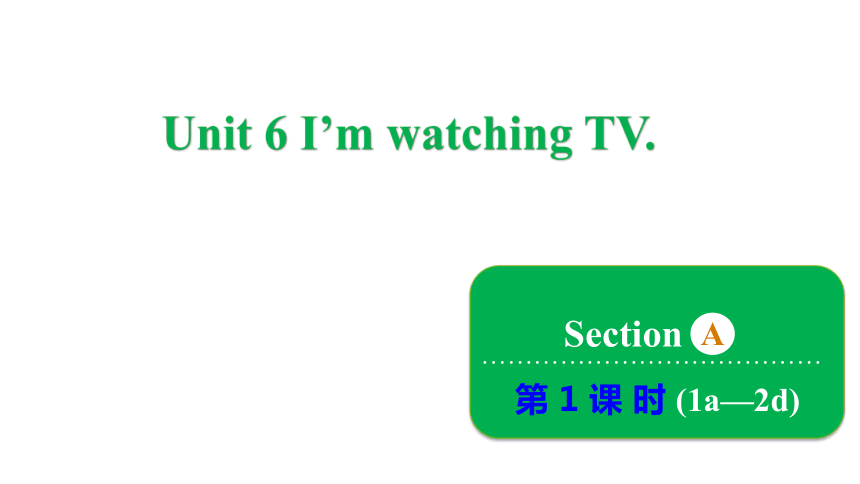 | |
| 格式 | pptx | ||
| 文件大小 | 3.1MB | ||
| 资源类型 | 教案 | ||
| 版本资源 | 人教新目标(Go for it)版 | ||
| 科目 | 英语 | ||
| 更新时间 | 2024-05-02 21:31:06 | ||
图片预览

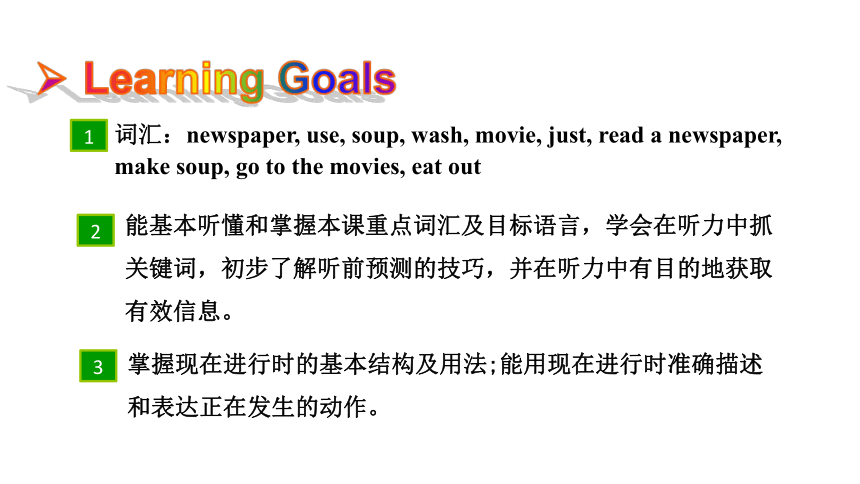
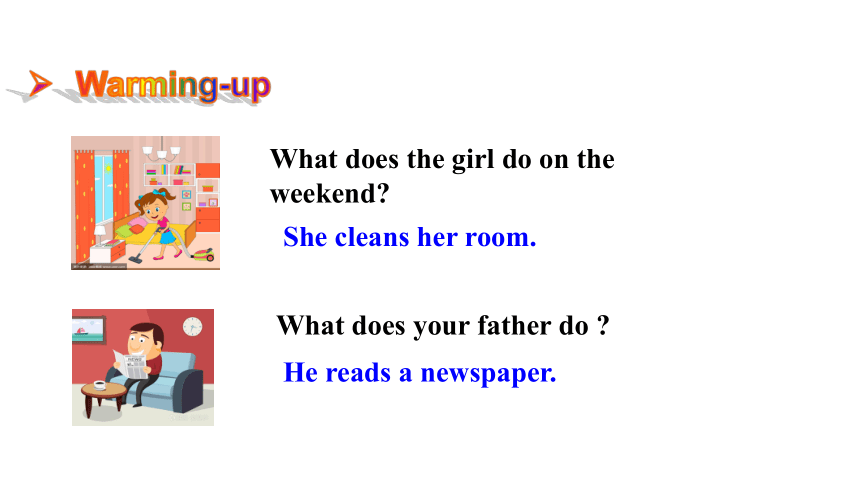
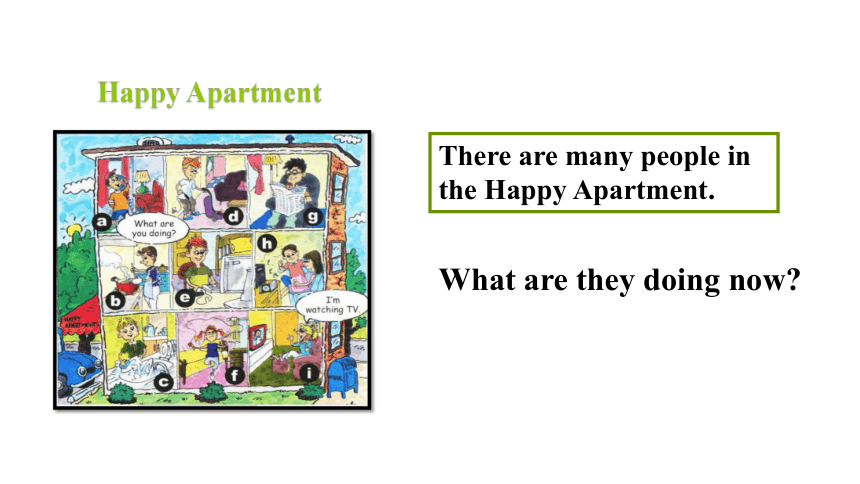
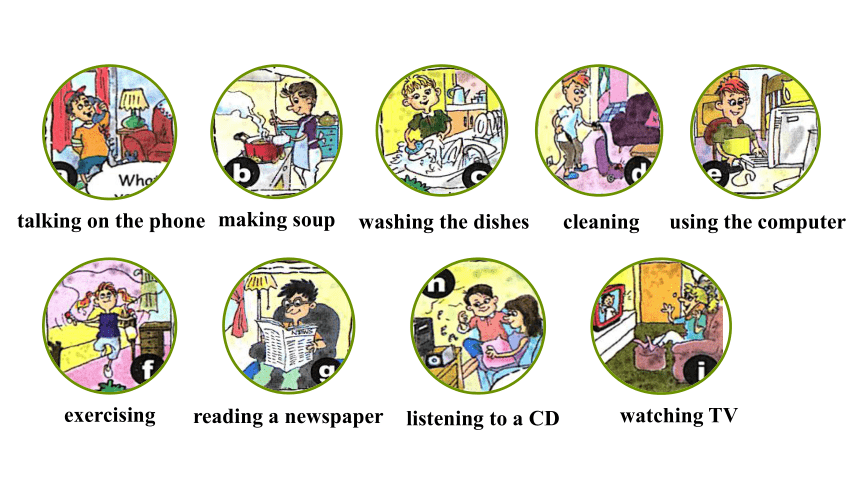
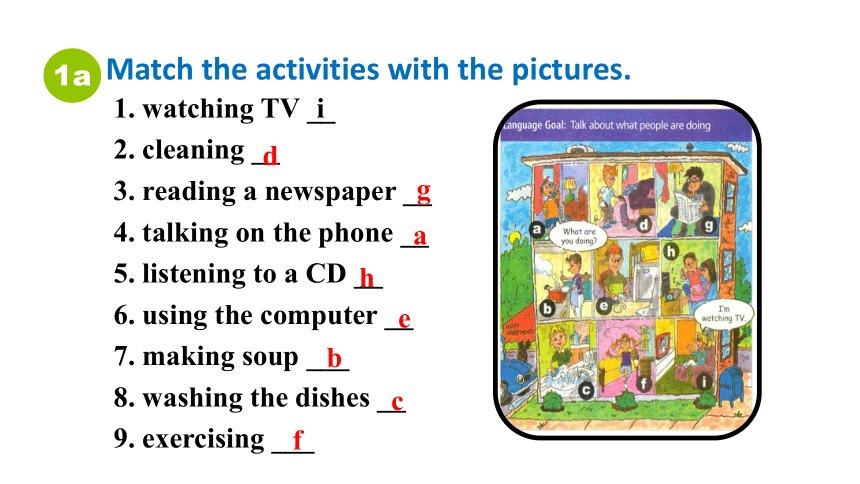
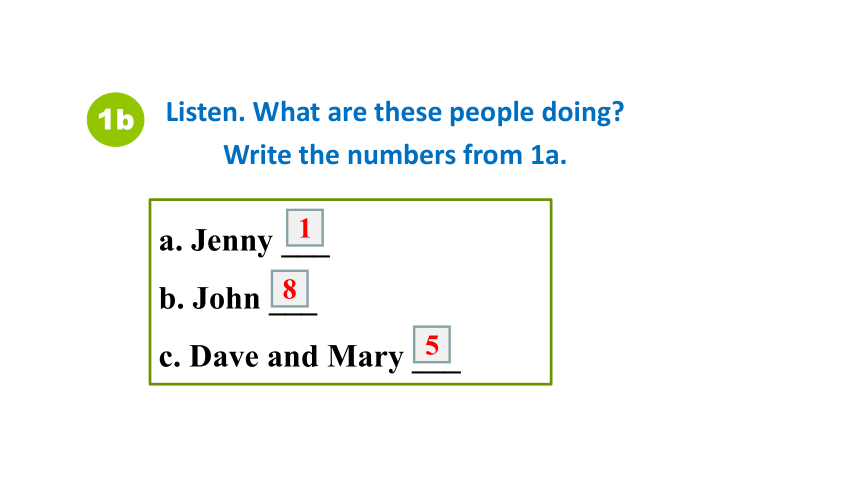
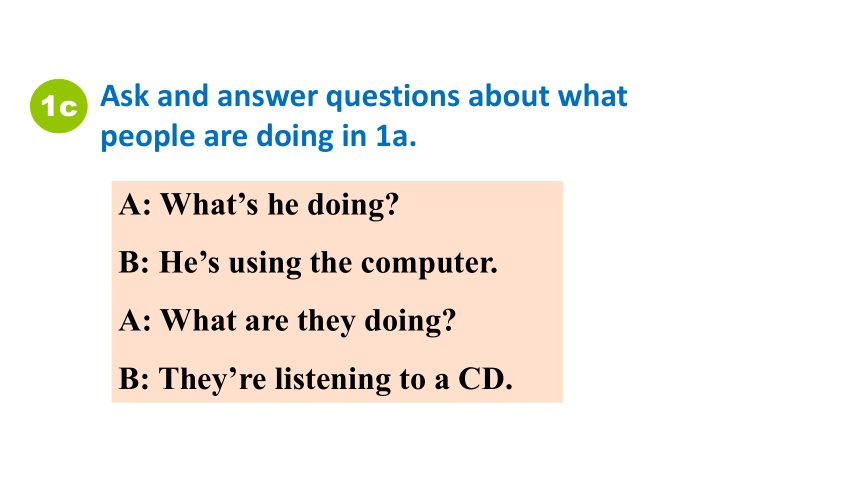
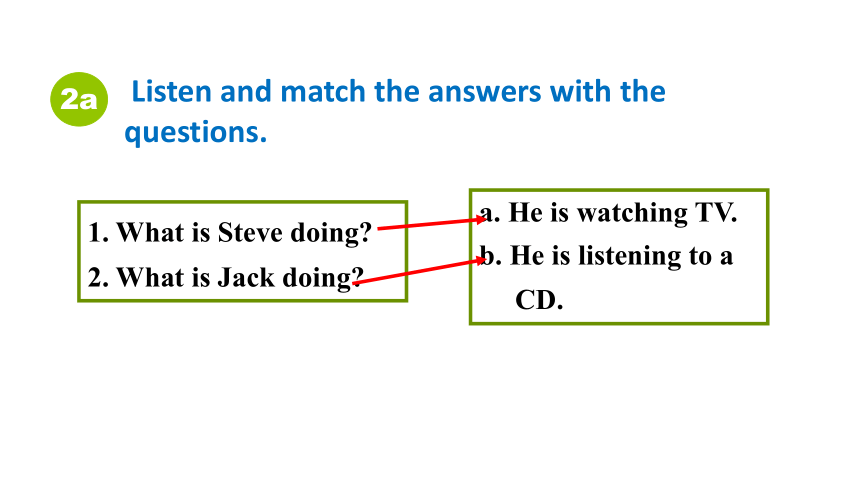
文档简介
(共27张PPT)
Section
Unit 6 I’m watching TV.
第 1 课 时 (1a—2d)
…………………………………
A
词汇:newspaper, use, soup, wash, movie, just, read a newspaper,
make soup, go to the movies, eat out
1
能基本听懂和掌握本课重点词汇及目标语言,学会在听力中抓关键词,初步了解听前预测的技巧,并在听力中有目的地获取有效信息。
2
Learning Goals
1
2
掌握现在进行时的基本结构及用法;能用现在进行时准确描述和表达正在发生的动作。
3
What does the girl do on the weekend
She cleans her room.
Warming-up
What does your father do
He reads a newspaper.
There are many people in the Happy Apartment.
What are they doing now
Happy Apartment
talking on the phone
watching TV
cleaning
reading a newspaper
listening to a CD
using the computer
making soup
washing the dishes
exercising
Match the activities with the pictures.
1. watching TV __
2. cleaning __
3. reading a newspaper __
4. talking on the phone __
5. listening to a CD __
6. using the computer __
7. making soup ___
8. washing the dishes __
9. exercising ___
a
g
d
i
h
e
c
b
f
1a
a. Jenny ___
b. John ___
c. Dave and Mary ___
1
Listen. What are these people doing
Write the numbers from 1a.
8
5
1b
A: What’s he doing
B: He’s using the computer.
A: What are they doing
B: They’re listening to a CD.
1c
Ask and answer questions about what
people are doing in 1a.
1. What is Steve doing
2. What is Jack doing
a. He is watching TV.
b. He is listening to a
CD.
Listen and match the answers with the questions.
2a
Jack: Hello, Steve.
Steve: Hi, Jack.
Jack: What _____ you ______, Steve
Steve: I’m ____________. What about you
Jack: I’m _______________, but it’s kind of
_______.
Steve: Yeah, my TV show is also not very _________. Do you want to _____ the movies
Jack: That sounds good.
are doing
watching TV
listening to a CD
Listen again. Fill in the blanks.
boring
interesting
go to
2b
Role-play the conversation in 2b.
2c
Think about how to make a phone call.
Jenny: Hello This is Jenny.
Laura: Hi, Jenny. It’s Laura here.
Jenny: Oh, hi, Laura. What are you doing
Laura: Not much. I’m just washing my clothes. What about you
Jenny: I’m watching TV. Do you want to join me for dinner My parents aren’t at home. We can eat out.
Laura: Yeah. I’d love to.
Jenny: Let’s meet at my home e at half past six.
Laura: OK. See you then.
Role-play the conversation.
2d
Read the conversation and answer the questions.
1. Are they talking on the phone
2. What is Laura doing
3. What is Jenny doing
4. Does Laura wan to have dinner with Jenny
5. Where do they meet
She is washing her clothes.
Yes, they are.
She is watching TV.
Yes, she does.
They meet at Jenny’s home.
Jenny: Hello This is Jenny.
Laura: Hi, Jenny. _____ Laura here.
Jenny: Oh, hi, Laura. __________________
Laura: Not much. I’m just _________________. What about you
Jenny: I ______________. Do you want to _________________ My parents aren’t at home. We can ___________.
Laura: Yeah. I’d love to.
Jenny: Let’s meet at my home first. ______ at half past six.
Laura: OK. ____________.
It’s
What are you doing
washing my clothes
join me for dinner
Come
See you then
am watching TV
eat out
Read the conversation again and fill in the blanks.
This is Jenny. 我是珍妮。/ It’s Laura here. 我是劳拉。
这两句为交际用语中的电话用语,在英语电话用语中常用This is …或者It’s…来介绍自己,询问对方则要用Who is that 或者Is that…speaking 来表示。
Language points
1
拨打电话:May/Could I speak to…?
我可以和……通话吗?
Is that/this…(speaking) 你是……吗?
接听电话:This is…(speaking). 我是……
Who's that (speaking) 你是谁?
Who is speaking 谁在讲话?
This is the wrong number.你打错电话了。
【拓展】
表示电话占线、线路故障或听不清:
The line is busy now. 电话占线。
The line's bad. 线路不好。
Would you speak up, please 你能大点儿声吗?
其他:
Hold on, please. 请等一会儿。
Hold on for a moment/minute. 请稍等。
May/Should I take a message 需要留言吗?
—What are you doing 你在干什么呢?
—Not much. 没忙什么。
Not much.在这里是简略回答,是用作回答的交际套语,还可以说成Nothing much, 相当于汉语“不忙什么;没什么事”,表示自己有空。
2
Do you want to join me for dinner
你想跟我一起吃个饭吗?
join sb for sth 表示“与某人一起做某事;参与或加入到某人的行列中一起做某事”。
Would you come and join us for a cup of coffee
你来跟我们喝杯咖啡好吗?
3
I’d love to. 我很乐意。
I’d love to是I would love to 的缩略形式。I'd love to经常用于礼貌地接受他人的邀请,还可以说成I'd like to,但语气较前者稍弱。
—Would you like to go to the movies with me
——你愿意和我一起去看电影吗?
—Yes, I'd love/like to.
——是的,我非常愿意。
4
当婉言拒绝他人邀请时,多用I'd love to, but…或Sorry, I'm afraid I can't. Because ...
—Would you like to go swimming with me
你想跟我一起去游泳吗?
—I'd love to, but I'm too busy recently.
我很想去,但是我最近太忙了。
—Sorry, I'm afraid I can't, because I'm still have lots of work to do. 真抱歉,恐怕不行,我还有许多工作要做呢。
【拓展】
一、用所给词的适当形式填空。
1. —What are they doing
—They __________(talk) on the phone.
2. Mike is ______(use) the computer now.
3. The students are ______(run) on the playground.
4. Jane often _____(do) her homework after dinner.
5. She isn't _______(listen) to music. She is reading.
are talking
using
running
does
listening
Exercises
1. 她正在做什么?
______ she______
2. 他们正在锻炼。
They_____ _________.
3. 你父母正在看电视吗?
____your parents ________ TV
4. 看!那些学生正在打扫卫生。
Look!The students _____ ________.
What's
doing
are exercising
Are
watching
are cleaning
二、根据汉语意思完下列句子。
1. 你好!我是李明。____________________
你好,李明。我是杰克。 _________________________
2. 你在做什么,王芳?_______________________________
没什么。我在看报纸。
_________________________________
3. 你想和我们一起去吃晚饭吗?______________________________
Hello. This is Li Ming.
What are you doing, Wang Fang
Hi, Li Ming. It’s Jack here.
Not much. I’m reading a newspaper.
Do you want to join us for dinner
三、翻译下列句子。
School News:The school reporters are making a program named Happy School Moments . Now they are interviewing some students during the break (课间).
校园新闻:校园小记者要制作一个关于校园生活的节目《校园瞬间》,现在正在采访学生的课间活动。
任务:4人一组,一名记者,采访其他三人正在做什么,采访后做一个口头报告。
Happy School Moments
1. 总结打电话用语,与小组成员练习2d中的对话。
2. 完成报告。
Homework
Section
Unit 6 I’m watching TV.
第 1 课 时 (1a—2d)
…………………………………
A
词汇:newspaper, use, soup, wash, movie, just, read a newspaper,
make soup, go to the movies, eat out
1
能基本听懂和掌握本课重点词汇及目标语言,学会在听力中抓关键词,初步了解听前预测的技巧,并在听力中有目的地获取有效信息。
2
Learning Goals
1
2
掌握现在进行时的基本结构及用法;能用现在进行时准确描述和表达正在发生的动作。
3
What does the girl do on the weekend
She cleans her room.
Warming-up
What does your father do
He reads a newspaper.
There are many people in the Happy Apartment.
What are they doing now
Happy Apartment
talking on the phone
watching TV
cleaning
reading a newspaper
listening to a CD
using the computer
making soup
washing the dishes
exercising
Match the activities with the pictures.
1. watching TV __
2. cleaning __
3. reading a newspaper __
4. talking on the phone __
5. listening to a CD __
6. using the computer __
7. making soup ___
8. washing the dishes __
9. exercising ___
a
g
d
i
h
e
c
b
f
1a
a. Jenny ___
b. John ___
c. Dave and Mary ___
1
Listen. What are these people doing
Write the numbers from 1a.
8
5
1b
A: What’s he doing
B: He’s using the computer.
A: What are they doing
B: They’re listening to a CD.
1c
Ask and answer questions about what
people are doing in 1a.
1. What is Steve doing
2. What is Jack doing
a. He is watching TV.
b. He is listening to a
CD.
Listen and match the answers with the questions.
2a
Jack: Hello, Steve.
Steve: Hi, Jack.
Jack: What _____ you ______, Steve
Steve: I’m ____________. What about you
Jack: I’m _______________, but it’s kind of
_______.
Steve: Yeah, my TV show is also not very _________. Do you want to _____ the movies
Jack: That sounds good.
are doing
watching TV
listening to a CD
Listen again. Fill in the blanks.
boring
interesting
go to
2b
Role-play the conversation in 2b.
2c
Think about how to make a phone call.
Jenny: Hello This is Jenny.
Laura: Hi, Jenny. It’s Laura here.
Jenny: Oh, hi, Laura. What are you doing
Laura: Not much. I’m just washing my clothes. What about you
Jenny: I’m watching TV. Do you want to join me for dinner My parents aren’t at home. We can eat out.
Laura: Yeah. I’d love to.
Jenny: Let’s meet at my home e at half past six.
Laura: OK. See you then.
Role-play the conversation.
2d
Read the conversation and answer the questions.
1. Are they talking on the phone
2. What is Laura doing
3. What is Jenny doing
4. Does Laura wan to have dinner with Jenny
5. Where do they meet
She is washing her clothes.
Yes, they are.
She is watching TV.
Yes, she does.
They meet at Jenny’s home.
Jenny: Hello This is Jenny.
Laura: Hi, Jenny. _____ Laura here.
Jenny: Oh, hi, Laura. __________________
Laura: Not much. I’m just _________________. What about you
Jenny: I ______________. Do you want to _________________ My parents aren’t at home. We can ___________.
Laura: Yeah. I’d love to.
Jenny: Let’s meet at my home first. ______ at half past six.
Laura: OK. ____________.
It’s
What are you doing
washing my clothes
join me for dinner
Come
See you then
am watching TV
eat out
Read the conversation again and fill in the blanks.
This is Jenny. 我是珍妮。/ It’s Laura here. 我是劳拉。
这两句为交际用语中的电话用语,在英语电话用语中常用This is …或者It’s…来介绍自己,询问对方则要用Who is that 或者Is that…speaking 来表示。
Language points
1
拨打电话:May/Could I speak to…?
我可以和……通话吗?
Is that/this…(speaking) 你是……吗?
接听电话:This is…(speaking). 我是……
Who's that (speaking) 你是谁?
Who is speaking 谁在讲话?
This is the wrong number.你打错电话了。
【拓展】
表示电话占线、线路故障或听不清:
The line is busy now. 电话占线。
The line's bad. 线路不好。
Would you speak up, please 你能大点儿声吗?
其他:
Hold on, please. 请等一会儿。
Hold on for a moment/minute. 请稍等。
May/Should I take a message 需要留言吗?
—What are you doing 你在干什么呢?
—Not much. 没忙什么。
Not much.在这里是简略回答,是用作回答的交际套语,还可以说成Nothing much, 相当于汉语“不忙什么;没什么事”,表示自己有空。
2
Do you want to join me for dinner
你想跟我一起吃个饭吗?
join sb for sth 表示“与某人一起做某事;参与或加入到某人的行列中一起做某事”。
Would you come and join us for a cup of coffee
你来跟我们喝杯咖啡好吗?
3
I’d love to. 我很乐意。
I’d love to是I would love to 的缩略形式。I'd love to经常用于礼貌地接受他人的邀请,还可以说成I'd like to,但语气较前者稍弱。
—Would you like to go to the movies with me
——你愿意和我一起去看电影吗?
—Yes, I'd love/like to.
——是的,我非常愿意。
4
当婉言拒绝他人邀请时,多用I'd love to, but…或Sorry, I'm afraid I can't. Because ...
—Would you like to go swimming with me
你想跟我一起去游泳吗?
—I'd love to, but I'm too busy recently.
我很想去,但是我最近太忙了。
—Sorry, I'm afraid I can't, because I'm still have lots of work to do. 真抱歉,恐怕不行,我还有许多工作要做呢。
【拓展】
一、用所给词的适当形式填空。
1. —What are they doing
—They __________(talk) on the phone.
2. Mike is ______(use) the computer now.
3. The students are ______(run) on the playground.
4. Jane often _____(do) her homework after dinner.
5. She isn't _______(listen) to music. She is reading.
are talking
using
running
does
listening
Exercises
1. 她正在做什么?
______ she______
2. 他们正在锻炼。
They_____ _________.
3. 你父母正在看电视吗?
____your parents ________ TV
4. 看!那些学生正在打扫卫生。
Look!The students _____ ________.
What's
doing
are exercising
Are
watching
are cleaning
二、根据汉语意思完下列句子。
1. 你好!我是李明。____________________
你好,李明。我是杰克。 _________________________
2. 你在做什么,王芳?_______________________________
没什么。我在看报纸。
_________________________________
3. 你想和我们一起去吃晚饭吗?______________________________
Hello. This is Li Ming.
What are you doing, Wang Fang
Hi, Li Ming. It’s Jack here.
Not much. I’m reading a newspaper.
Do you want to join us for dinner
三、翻译下列句子。
School News:The school reporters are making a program named Happy School Moments . Now they are interviewing some students during the break (课间).
校园新闻:校园小记者要制作一个关于校园生活的节目《校园瞬间》,现在正在采访学生的课间活动。
任务:4人一组,一名记者,采访其他三人正在做什么,采访后做一个口头报告。
Happy School Moments
1. 总结打电话用语,与小组成员练习2d中的对话。
2. 完成报告。
Homework
同课章节目录
- Unit 1 Can you play the guitar?
- Section A
- Section B
- Unit 2 What time do you go to school?
- Section A
- Section B
- Unit 3 How do you get to school?
- Section A
- Section B
- Unit 4 Don't eat in class.
- Section A
- Section B
- Unit 5 Why do you like pandas?
- Section A
- Section B
- Unit 6 I'm watching TV.
- Section A
- Section B
- Review of Units 1-6
- Unit 7 It's raining!
- Section A
- Section B
- Unit 8 Is there a post office near here?
- Section A
- Section B
- Unit 9 What does he look like?
- Section A
- Section B
- Unit 10 I'd like some noodles.
- Section A
- Section B
- Unit 11 How was your school trip?
- Section A
- Section B
- Unit 12 What did you do last weekend?
- Section A
- Section B
